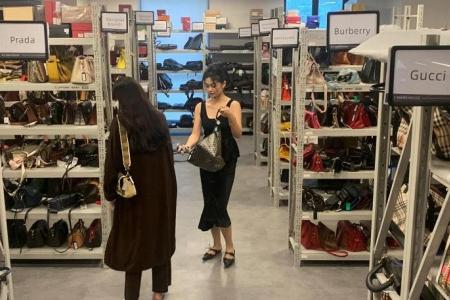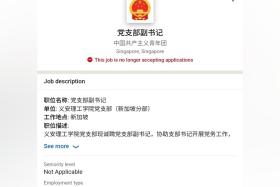Chinese snap up used Rolexes, Birkins to satisfy luxury cravings
SHANGHAI - China's coronavirus-driven economic slowdown is proving to be a boon for Mr Zhu Tainiqi, the Shanghai-based founder of second-hand luxury goods marketplace ZZER, who is now scouting for shop space to expand the business.
The former venture capitalist is seeing a surge in people looking to sell their Hermes Birkin bags or Rolex watches to raise cash, as well as a jump in interest from belt-tightening shoppers.
"More and more people are now aware they can sell luxury goods for some money and the buyer side is noticing that they can get a great deal," said Mr Zhu, 33. "They think, 'Why not give it a shot?'"
He said the number of ZZER's consigners, or people putting up their goods for sale, has soared 40 per cent so far in 2022 over the same period of 2021. The platform now has 12 million members and expects to sell 5 million luxury pieces this year.
The trend indicates a significant change in China's US$74 billion (S$107 billion) luxury goods sector, where the second-hand luxury sub-segment has been slow to take off versus other markets such as Japan and the United States due to a preference for newness and fears of unsuspectingly buying a fake.
It could have ramifications for the China-focused strategies of the world's big luxury goods makers, who are grappling with softening demand in the key market.
"I think because of China's interest...that can really move the needle for some brands to think about how they're going to handle this (resale) market, and what role they are going to play in the whole process," said Ms Iris Chan, a partner and head of client development at consultancy Digital Luxury Group.
China's second-hand luxury market is tipped to grow to US$30 billion in 2025 from US$8 billion in 2020, consultancy iResearch said late last year. New estimates from this year are yet to be released.
Office worker Wang Jianing is exploring buying second-hand luxury products, given the economic climate.
"My consumption will definitely be downgraded (this year), but I still like what I like, and I can't control the desire to buy it," she told Reuters, standing in front of a wall displaying Louis Vuitton and Gucci bags in ZZER's cavernous downtown Shanghai warehouse.
ZZER is banking on sentiments such as Ms Wang's for growth.
The company, which started as an online platform in 2016, began opening offline stores in Shanghai and Chengdu last year and is now looking for more shop space in Beijing, Guangzhou and Shenzhen.
Besides ZZER, other top platforms are local names, such as Feiyu, Ponhu and Plum. Each of them drew tens of millions of dollars in venture capital funds in 2020 and 2021 with an eye to improving authentication practices, widening customer reach and, in some cases, moving from online-only to online-offline models.
China's luxury resale marketplace is expected by analysts to remain dominated by local players for now. International companies such as Vestiaire Collective and The RealReal are yet to enter the mainland China market and confirmed to Reuters they have no immediate plans to do so.
Though handbags remain the top-selling category on luxury platforms such as ZZER, Mr Zhu said sales of watches and jewellery are also growing fast.
While a nylon Prada Messenger or Fendi Baguette bag sells for 30-40 per cent less on resale platforms than in luxury boutiques, some products have seen the price gap widen further as more consigners rush to sell goods online.
Veteran vintage seller Ou Huimin, who opened her Ding Dang store in Guangzhou a decade ago and also sells country-wide via livestreams, said speculators in the market have sent prices for top-tier luxury goods soaring.
Ms Ou said Rolex Submariner watch prices rose almost 250 per cent between 2020 and 2021, but have pulled back as much as 60 per cent this year.
"Now consumption has become more rational," she added. - REUTERS
Get The New Paper on your phone with the free TNP app. Download from the Apple App Store or Google Play Store now


